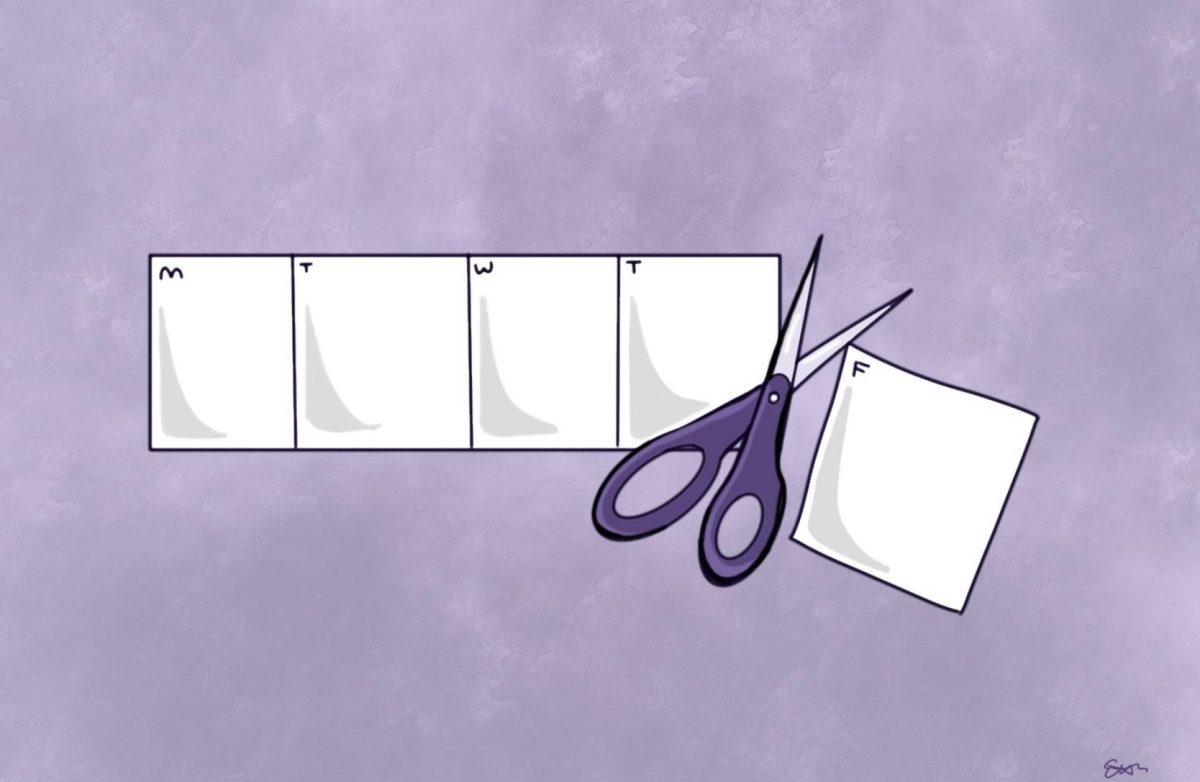The United States’ work-life balance is laughable, and a four-day workweek could be a solution.
America’s work ethic is part of the reason Americans are dying earlier, and in worse mental and physical conditions than other comparable countries, according to a July 2009 study from National Research for Health.
Take, for example, the European Union Working Time Directive, passed in the late 90s, that guarantees 20 days of paid time off for all EU-member states, according to an April 19 article from CNBC.
France has even advanced this number to 30, whereas the United States government doesn’t guarantee a single day off.
Americans deserve to have enough time to enjoy leisure activities, which are beneficial for well-being and health, according to the same July 2009 study.
Of course, there is the possibility that Americans just don’t want a longer weekend.
However, 76% of Gen Z, 90% of millennials, 86% of Gen X and 81% of boomers would prefer a four-day workweek, according to a Nov. 2021 Goodhire survey.
Due to the plan’s intergenerational popularity, a few companies have conducted trials to explore its benefits.
These pilot programs have been largely successful, with one trial reporting that 56 of the 61 companies participating in the experiment would continue this approach going forward, according to a Feb. 21 article by the Washington Post.
The workers in these programs reported better sleep, hygiene, reduced stress and noted improvements in their personal lives and mental health.
On the financial end, company revenue stayed mostly the same, even being improved because of a reduction in resignations, according to the article.
The four-day workweek doesn’t only exist through the scope of trials and experiments. Shawn Fain, president of the currently-striking United Auto Workers, included it in his recent list of pro-worker demands.
Fifty-four percent of Americans support the UAW’s strike, according to a survey from Morning Consult.
Fein’s demands also include good wages, recreation and spending time with family, according to a Sept. 11 NPR article.
Wages are especially relevant to a four-day workweek. Since the 80s, worker productivity continued to increase at the same rate, while real wages stagnated—meaning Americans are producing more, but not receiving an equal return.
This economic phenomenon is dubbed by economists as “the Great Decoupling,” according to the Harvard Business Review.
A 32-hour, four-day workweek, at the same pay, would play a role in restoring this balance within the scope of economic justice.
The professional sphere is not the only place that a four-day workweek could be beneficial, and UVM has the opportunity to gauge this ambitious plan for itself.
Students who manage not to take any Friday classes are already envied for this luxury, but there’s no reason it couldn’t become standard for most students.
Wes Pratt, a junior business administration major, happens to have one of these lucky schedules.
“My stress level has decreased significantly,” Pratt said, “I have no classes on Friday this semester, so I have more time to do the things that I love. My mental health has improved, I’m able to get more done and better my time management skills.”
As of right now, most students I know have rigid schedule choices: 50-minute classes Monday, Wednesday and Friday, and 75-minute classes Tuesday and Thursday, sometimes labs or longer blocks, but not much deviation.
Despite the ease of a quick 50-minute class, I’ve heard numerous professors mention their dislike of its shortness, and I can understand their concerns.
Considering the benefits of a four-day workweek, UVM could experiment with a pilot program, using different variations of class lengths and meeting days, all while ensuring three days off.
This would allow for students with jobs to better manage the difficulties of employment, as well as giving students with a tough workload more time to study and enjoy a well-earned repose.
For all students, it would mean more hobbies, clubs, friends and personal advancement, exactly what college is intended to be outside of academia.
The five-day workweek is a well-established norm over a century old, according to National Geographic, and while there’s no denying that it would be a radical endeavor to make the switch, UVM should strive to be a pioneer of tomorrow.
That tomorrow looks like a four-day workweek, creating happier, smarter and healthier citizens.











